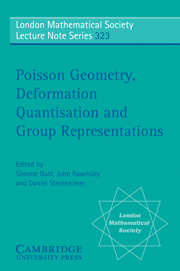Book contents
- Frontmatter
- Contents
- Preface
- Part One Poisson geometry and morita equivalence
- Part Two Formality and star products
- Part Three Lie groupoids, sheaves and cohomology
- 1 Introduction
- 2 Lie groupoids
- 3 Sheaves on Lie groupoids
- 4 Sheaf cohomology
- 5 Compactly supported cohomology
- Bibliography
- Part Four Geometric methods in representation theory
- Part Five Deformation theory: a powerful tool in physics modelling
- Index
5 - Compactly supported cohomology
Published online by Cambridge University Press: 04 August 2010
- Frontmatter
- Contents
- Preface
- Part One Poisson geometry and morita equivalence
- Part Two Formality and star products
- Part Three Lie groupoids, sheaves and cohomology
- 1 Introduction
- 2 Lie groupoids
- 3 Sheaves on Lie groupoids
- 4 Sheaf cohomology
- 5 Compactly supported cohomology
- Bibliography
- Part Four Geometric methods in representation theory
- Part Five Deformation theory: a powerful tool in physics modelling
- Index
Summary
In this chapter we will discuss a cohomology with compact supports for étale groupoids, first introduced in [14], and further developed in [16, 45]. Our presentation is based on these sources. This compactly supported theory will again be invariant under Morita equivalence, hence is well defined for the wider class of foliation groupoids.
Given the fact that many of the étale groupoids arising in the context of foliations are non-Hausdorff, the notion of ‘compact support’ needs to be applied in the context of non-Hausdorff manifolds. The appropriate definition for which the usual properties known in the Hausdorff case extend to this wider context is somewhat subtle, and we have decided to devote the first section of this chapter to a detailed discussion of this matter. Subsequently, we introduce the cohomology theory with compact supports, and develop its main general properties. In particular, we discuss the covariant operation ø!, we derive a Hochschild-Serre type spectral sequence, and we prove the Morita invariance already referred to above. The theory is in some sense dual to the cohomology theory developed in the previous chapter. We will make this more precise by proving that the cohomology groups with compact supports are isomorphic to suitable homology groups of the embedding category. This result is parallel to the result for cohomology proved in Chapter 4, and leads to an easy proof of Poincaré duality for étale groupoids.
The compactly supported cohomology discussed here is related by natural maps to the basic cohomology with supports [25], and to foliated cohomology of [27, 49].
- Type
- Chapter
- Information
- Publisher: Cambridge University PressPrint publication year: 2005



